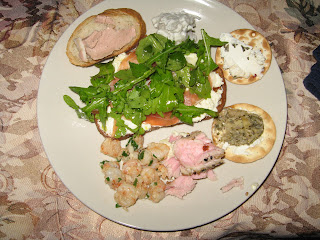The Format:
As at my last pairing party, guests and I provided wine and food items. This time the theme was Pinot Blancs and Pinot Gris or Grigios from around the world. I wanted to see how these two different varietals compared both with each other, and within their regional examples. We shared food items which we hoped would pair with one or the other varietal. Interestingly, several foods paired well with both.
As it happens, these varietals are related. Pinot Blanc is, in fact, a mutation of Pinot Gris, which is in turn a mutation of Pinot Noir. Widely cultivated in the Alsace region of France, Pinot Blanc is being produced in a number of other regions, including Monterey County, where our domestic example hales from. While its profile differs depending on the terroir and winemaking style of its region, Pinot Blanc often produces fairly full bodied wines with higher acidity. Pinot Gris, also produced in Alsace, has taken hold in a big way in Italy, and of course, in California and Oregon. Oregon growers such as our example below tend to produce medium-bodied, aromatic wines, while Italian examples tend to be crisp and light-bodied.*
The Wine Lineup:
As it happens, these varietals are related. Pinot Blanc is, in fact, a mutation of Pinot Gris, which is in turn a mutation of Pinot Noir. Widely cultivated in the Alsace region of France, Pinot Blanc is being produced in a number of other regions, including Monterey County, where our domestic example hales from. While its profile differs depending on the terroir and winemaking style of its region, Pinot Blanc often produces fairly full bodied wines with higher acidity. Pinot Gris, also produced in Alsace, has taken hold in a big way in Italy, and of course, in California and Oregon. Oregon growers such as our example below tend to produce medium-bodied, aromatic wines, while Italian examples tend to be crisp and light-bodied.*
The Wine Lineup:
2007 Graff Family Chalone Pinot Blanc (100% Pinot Blanc, French oak fermented and aged, 14.3% alcohol) – creamy, floral, hint of tangerine, hints of smokiness and something woody
 2007 Domaine Zind Humbrecht Pinot D’Alsace (blend of Auxerrois and Pinot Blanc, biodynamically grown, 13.5% alcohol) – herbal, a bit floral, hints of lemon
2007 Domaine Zind Humbrecht Pinot D’Alsace (blend of Auxerrois and Pinot Blanc, biodynamically grown, 13.5% alcohol) – herbal, a bit floral, hints of lemon2008 Willamette Valley Elk Cove Pinot Gris (stainless steel fermented, 13% alcohol) – tangerine (some said naval orange instead) and green apple, bright acidity, mineral notes
2008 Bivio Pinot Grigio Delle Venezie (100% Pinot Grigio, stainless steel aged, 12.5% alcohol) – meyer lemon, nutty, a bit herbal
2008 Motos Liberty California Pinot Grigio – our bonus opening wine had honeysuckle in the nose, notes of melon, honey, citrus
The Cuisine:
A lovely goat cheese with crackers
A tasty pâté
Prosciutto, Ricotta & Arugula Crostini
Grilled Ahi Tuna
Smoky Citrus Shrimp with Parsley
Sour Cream Herring
The Votes:
As before, our pairing preferences varied in an ever fascinating matter. However, here are some generalizations. The Graff Family Pinot Blanc paired particularly well with the ahi and the crostini. The Zind Pinot d’Alsace was exceptional with the pâté, and was also quite good with the shrimp. The Elk Cove Pinot Gris was wonderful with the goat cheese, but also stood up well with the ahi, shrimp and crostini. Finally, the Bivio Pinot Grigio was excellent with both the crostini and the pâté, but complimented almost all the food items nicely. We all agreed that the sour cream herring – which had been a bit of an experiment on my part – didn’t pair very well with the wines, although the Graff Pinot Blanc handled it better than the others. There was also a bit of a consensus that the Bivio Pinot Grigio was an excellent food wine, pairing pretty well with all of the food items.
Once again, a fun experiment, and a good time had by all!
* Wine descriptions come primarily from The Oxford Companion To Wine, Jancis Robinson editor, 2d ed. Oxford: Oxford University Press (1999)


